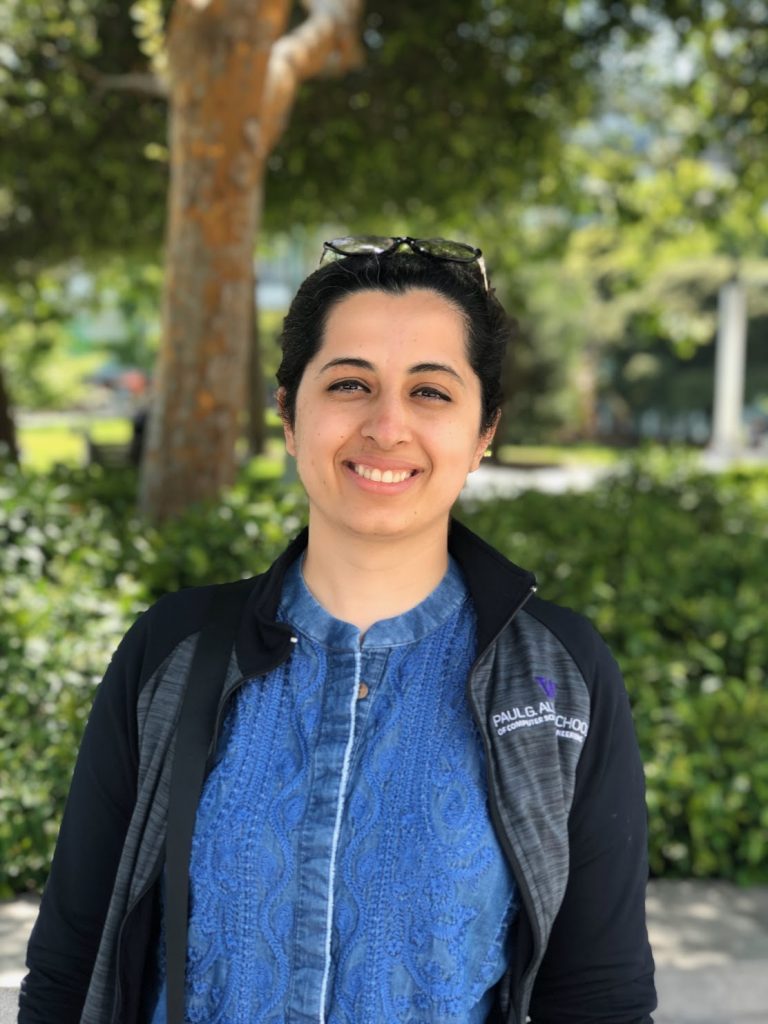
Samia Ibtasam, a Ph.D. student working with Allen School professor Richard Anderson in the Information and Communication Technology for Development (ICTD) Lab, has been named a 2021 American Association of University Women International Fellow for her work in creating training support tools for women to increase technological inclusion. Her research focuses on gender inequality in technological and financial services and building tools for women to use to narrow the gap.
AAUW International Fellows are women studying or researching full-time in the United States that are not U.S. citizens. Ibtasam is from Pakistan and has been conducting ICTD research there for more than a decade. She explored the development of novel solutions to poverty as well as the impact of technology on marginalized populations there, before choosing to pursue her Ph.D. at the University of Washington.
“My work focuses on the fact that the digital divide is more than binary descriptors of haves and have nots. It is a spectrum that goes all the way from novice users who don’t know how to use digital devices to experts,” Ibtasam said. “In my research, especially with low-income men and women, I have seen that during these many stages of technology engagement and adoption, training by someone who is mostly a human plays an integral role in helping users get ahead. This is especially true for low-income or low-literate populations as the fear of breaking devices, the fear of transacting and causing loss to themselves is higher for them. Thus, for low-income women, their family members in the form of children, brothers, and others come in as informal trainers.”
Through preliminary fieldwork in 2017 and 2018, Ibtasam found that Pakistani women business owners had advanced technological needs to communicate with clients, coordinate schedules with family members, remember materials or items purchased or sold and track the amount they received and sales on credit. Recalling business transactions while managing household activities is overwhelming for many of the women she spoke with — and they often have an added barrier of little to no literacy. Some of the women she observed are forced to rely on their own recall, their children’s note-taking, or dictating daily transactions to family members at the end of the day. To address these issues, Ibtasam is working to better support transactional recordkeeping for these business owners.
Ibtasam aims to build a training framework to incorporate assistance for them into mobile applications. Device-provided training for the women will include various types of help to enable users to learn to use the system. The training would include demos, walkthroughs, screen level help, audio or text cues and videos. The program would be incorporated into an application and provided to participants in her study, which will enable her to gauge how it helps them to perform certain tasks and see how useful it will be to businesses.
“Samia’s vast experience with development in Pakistan, as well as deep knowledge of financial service usage from prior research, makes her uniquely suited to explore solutions for financial empowerment of women,” said Allen School professor Kurtis Heimerl, who has worked with Ibtasam in the ICTD Lab. “Her research agenda, focused on providing voice interfaces to marginalized women entrepreneurs in Pakistan, is extremely novel and will produce both top-flight research into the HCI components of such systems as well as provide a meaningful impact on marginalized communities.”
Ibtasam pointed out that Pakistan is the fifth most populous country in the world, yet it has one of the world’s largest mobile phone ownership and technology gender gaps — despite the fact that the country is continuing to grow its digital infrastructure. She hopes that her project will make the digital divide smaller and she herself plans to continue offering guidance and mentorship to young girls who want to pursue a STEM education.
Before coming to the Allen School, Ibtasam was a faculty member in the Department of Computer Science at the Information Technology University in Lahore, Pakistan, where she taught design thinking, human-centered design and technology for global development. She was also the co-director of the Innovations for Poverty Alleviation Lab. She previously was named an Acumen Fund Regional Fellow for Pakistan and earned a Marilyn Fries Regental Endowed Fellowship and a Google Women Techmaker Scholarship.
Congratulations, Samia!

